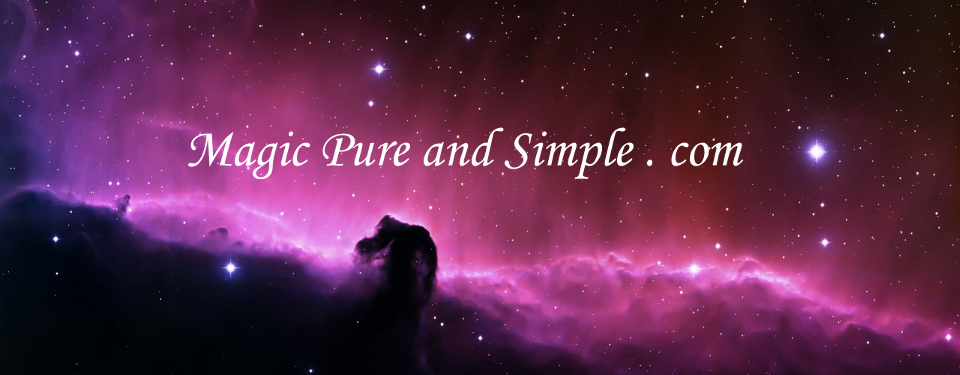The term originates from the term for Persian priests of the Zoroasterian religion whom the Greeks called Magos (or Magoi for plural). Old Persian may have called them “Magush”. It is from this word that the word Magic is derived. It originally meant “of or related to Persian priests”. It is possible that the Magi, which were claimed to have visited the baby Jesus, were Persian priests. Their description is simply “men of the east”. Later the term Magician was born in Latin to mean someone who practices Magic or supernatural powers and the association with Zoroaster or Persia was forgotten.
Aleister Crowley coined the terms Magick and Magickian (pronounced the same as Magician). These terms appeared frequently in the 16th century when spelling was inconsistent, but not as something intentionally separate from Magician until the 19th century. Some like the term Magick suggesting that it distinguishes between stage magicians and practitioners of sacred magic. Aleister Crowley liked the term because he believed that when each letter was assigned a number, words that added up to certain numbers were magically connected to other words with the same total. He felt Magick provided some significance that magic failed to reveal. Personally, I think if you have to misspell a word to give it the number you want, it probably doesn’t have the significance or my name isn’t Hadronb (with a silent b) so its the same number as “miracles” and “praying” rather than Hadron which is the same number as sin, terrible and wrath.
Prior to the modern day, magicians were represented differently from witches. For example, they would be represented with books and wands instead of cauldrons. They also used the holy magic circle to separate their bodies from the demons they dealt with. Eliphas Levi suggests that summoning is done into a marked-out triangular shape, which he represents outside the circle, separating the magician from what he might summon.

In the Neopagan community, magician often has an association with High Magic or grimoire magic (explained below). It is a gender-neutral term and both men, women and NBs can be Magicians, but the spirits and names that many magicians work with are predominantly male, due to the Judeo-Christian influence. While the term’s origin just suggests a practitioner of magic, it has come to be synonymous with ceremonial magician below.
Mage
Mage is occasionally used to describe oneself. The way it is used by the Neopagan and Occult communities, it can be more synonymous with Wizard and Druid, than with Ceremonial Magician.
Ceremonial Magician / Ritual Magician
This term is similar to Magician except that it implies the practitioner primarily uses ceremonies or ritual magic. Often Ceremonialist, Ceremonial Magician, Magician, and Ritual Magician are used interchangeably, sometimes with an unneeded k thrown in to confuse the layperson. Often the implication here is High Magic which consists of Theurgy (neoplatonic mysticism) and Qabalah (Jewish mysticism). High Magic is a ritual practice, which often uses Judeo-Christian god names to compel spirits to act in accordance with the will of the magician so it often is considered a Christian magical practice. It often uses practices found in grimoires to summon and control demons. The Neopagan community often treats High Magic as stuffy and snobbish and let’s face it, if anyone is describing their practice as “higher” than someone else’s they are probably quite a snob, either that or off their face.
In the 80s, some witches on television frequently suggested there was a difference between witches and Magicians in that Magicians would use animal sacrifices whereas witches would not. These interviewees would claim that witches had other methods of raising energy. (See BBC interviews with Doreen Valiente and Janet Farrar.) This, however, was inaccurate, both types of practitioners rarely sacrifice animals. In my own personal experience, magicians often follow more strict training syllabi which provide a wider variety of methods for raising energy. On the other hand, witches champion far greater freedom for the learning in their initiates, but this can mean they often leave whole areas of training absent. One could say witches had more faith in the universe to provide the necessary training. The strict training of magicians is often seen as stuffy and old-fashioned. It’s not liberal enough for many and does not allow for initiates who are differently minded or differently able, but in my experience, it does lead to much more knowledgeable initiates.
Magicians have so much studying to do that some rarely get down to practice. The high amount of study before starting a working often makes them complacent with not practising at all! Often magicians spend hours thinking about work without actually doing it. Someone who does this is derogatively referred to as an Armchair Magician / Armchair Occultist. It is always undesirable because they lack actual experience and mystic insight, but they feel a real need to contribute their opinion to people who are actually doing the work. They are the back-seat drivers of the Occult world.
In his work “Techniques of Solomonic Magic”, Stephen Skinner mentioned the use of a familiar spirit called a Paredos, but familiar spirits are not normally associated with Ceremonial Magicians as much as with witches, sorcerers and mediums. In the late 19th century and 20th century the sudden popularity of a 17th-century text known as “the Sacred Magic of Abramelin the Mage” popularised the use of a Holy Guardian Angel to compel spirits, which functions like a transcendental spirit guide.
See also other types of Magical Practitioner.

Comments
One response to “What is a Magician?”
[…] Magician / Magi / Magickian / Mage / Ceremonial Magician / Ritual Magician […]